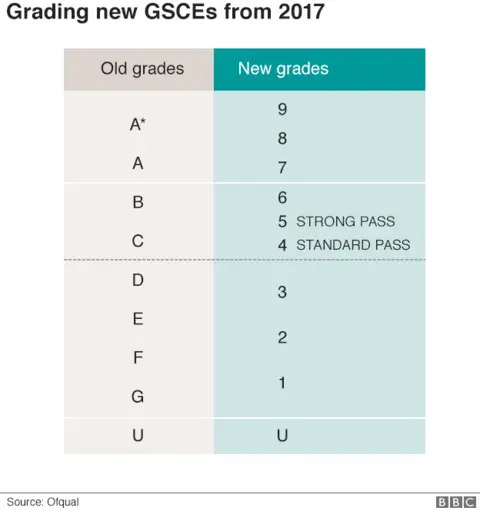GCSE results: How the new grading system works
 Getty Images
Getty ImagesFrom this year, some GCSE papers in England are being graded numerically on a scale from 9 to 1.
Remember politicians saying GCSEs were too easy and needed to be made more rigorous?
Well that's what has been happening, as new exams have been developed and are being phased in over a number of years.
This year's students are the first to sit exams in the new GCSES in English (literature and language) and maths - arguably the biggest subjects in the curriculum.
Another 20 subjects will have 9 to 1 grading in 2018, with most others following in 2019.
New numbering system
Contrary to what you might expect, 1 is not the highest grade, 9 is.
However, 9 will be awarded to fewer pupils than A* is currently.
In fact, three number grades, 9, 8 and 7, correspond to the current top grades of A* and A.
This is designed to give more differentiation at the top end.
A grade 6 is a bit higher than the old B grade.

Two pass marks?
And - unlike the current system, under which a C is seen as a "good" pass - the new system has a "standard pass", a grade 4, and a "strong pass", grade 5.
The Department for Education has stressed that the old and new grading systems cannot be directly compared.
But there are points where they align.
The bottom of the current grade C and the bottom of the new grade 4 is probably the key point of alignment.
This has prompted some employers to say the system is confusing.
Measuring schools
Schools will be measured on the proportion of pupils achieving grade 4 and above.
But they will also be measured on the proportion of pupils achieving grade 5 and above.
And this grade 5 is being described as the benchmark, in line with the expectations of the strong performing education systems around the world.
Education secretary Justine Greening said she expected more pupils to get a grade 5 over time as England's education system improved.
Meanwhile, at the bottom, the new system has less detail, with grades D, E and F corresponding to grades 1 and 2, and the bottom of a grade 1 corresponding to the bottom of a grade G.
Harder GCSEs?
The short answer is yes.
The Department for Education has deliberately required exam boards to make exam content more "challenging".
The way the questions are set out in maths, for example, is very different to what has come before.
And the way the qualifications are taken, with exams at the end, rather than with modules - tested in stages along the way at different parts of the year - is also seen as more demanding.
But, and it is a big but, exam boards will use statistical measures to ensure that standards remain the same.
So despite what are really quite significant changes, broadly the same proportion of students that received a grade C or above in 2016 will receive a grade 4 and above this year.
Is it fair?
And the same share of students will receive a grade 7 as received a grade A last year.
However, if candidates find an exam paper harder than expected the grade boundaries will be set a little lower.
So they may need a few less marks to get a certain grade than they would have done previously.
Thus, continuity of standards is maintained so that the first crop of students to take these exams are not disadvantaged.
However, some teachers' leaders have complained about the level of difficulty in the new exams.
Maths has been particularly tricky - with pupils from top sets of their schools coming out of exams saying they could not understand whole sections of the exam paper.
And head teachers say they are concerned about the scale of pressure being placed on pupils, due to the high stakes nature of these new exams.
The rest of the UK
This year also marks a divergence in qualifications between the nations, with candidates in England, Wales and Northern Ireland now all studying different exams.
In Wales, exams in English, Welsh and maths (six GCSEs in total) have also been toughened, but the qualification is still taken in units. New GCSEs in other subjects are being phased in.
In Northern Ireland, pupils are generally sitting old-style GCSEs in all subjects this year, but changes are ahead.
Scottish students already study completely different qualifications.
